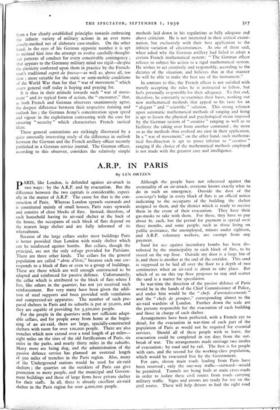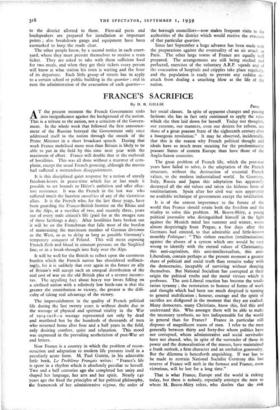A.R.P. IN PARIS
By LEN ORTZEN
DARTS, like London, is defended against air-attack in I- two ways: by the A.R.P. and by evacuation. But the difference between the two capitals is considerable, especi- ally in the matter of A.R.P. The cause for that is the con- struction of Paris. Whereas London sprawls outwards and is constituted mainly of small houses, Paris rears upwards and consists of close blocks of fiats. Instead, therefore, of each household having its air-raid shelter at the back of the house, the occupants of each block of flats depend on the nearest large shelter and are fully informed of its whereabouts.
Because of the large cellars under most buildings Paris is better provided than London with ready shelter which can be reinforced against bombs. But cellars, though the principal, are not the only refuge provided for Parisians. There are three other kinds. The cellars for the general population are called "abris d'ilots," because each one cor- responds to a block of flats or even to a group of buildings. These are those which are well enough constructed to be adapted and reinforced for passive defence. Unfortunately, the cellar which is attributed to the block of flats where I live, like others in the quartier, has not yet received such reinforcement. But very many have been given the addi- tion of steel supports and been provided with ventilation and compressed-air apparatus. The number of such pre- pared shelters in Paris and its suburbs is put at 5o,000, and they are capable of providing for 3,500,000 people.
For the people in the quartiers with not sufficient adapt- able cellars, and for people away from home at the begin- ning of an air-raid, there are large, specially-constructed shelters with room for over roo,000 people. There are also trenches which now extend over a total length of 4o miles— eight miles on the sites of the old fortifications of Paris, six miles in the parks, and nearly thirty miles in the suburbs. Many more are being dug, and the administration of the passive defence service has planned an eventual length of 500 miles of trenches in the Paris region. Also, many of the Underground stations would be used for air-raid shelters ; the quarries on the outskirts of Paris can give protection to more people, and the municipal and Govern- ment buildings and those of large firms have private shelter for their staffs. In all, there is already excellent air-raid shelter in the Paris region for over 4,000,000 people. Although the people have not rehearsed against the eventuality of an air-attack, everyone knows exactly what to do in such an emergency. Outside the door of the concierge's lodge in every block of flats is an official notice indicating to the occupants of the building the shelter assigned to them, and the district which is ready to receive them in the event of their evacuation. They have their gas-masks to take with them. For these, they have to pay about 8s. each, but the period for payment is spread over three months, and some people, such as those living on public assistance, the unemployed, minors under eighteen, and A.R.P. voluntary workers, are exempt from any payment.
Sand for use against incendiary bombs has been dis- tributed by the municipality to each block of flats, to be stored on the top floor. Outside my door is a large bin of it, and there is another at the end of the corridor. This sand is supposed to be laid all over the floor to a depth of two centimetres when an air-raid is about to take place. But which of us on this top floor proposes to stay and scatter the sand is a matter for speculation.
In war-time the direction of the passive defence of Paris would be in the hands of the Chief Commissioner of Police, and under him would be the " chefs d'arrondissements " and the " chefs de groupes," corresponding almost to the air-raid wardens of London. Further down the scale are the persons responsible for the evacuation of each building and those in charge of each shelter.
Arrangements have been perfected, with a French eye to detail, for the evacuation in war-time of such part of the population of Paris as would not be required for essential services. Should all of these people wish to leave, the evacuation could be completed in ten days from the out- break of war. The arrangements made envisage two modes of evacuation: by road and by rail. The first is for people with cars, and the second for the working-class population, which would be evacuated free by the Government.
For cars, eleven main roads leading from Paris have been reserved ; only the one-way traffic—outward—would be permitted. Tunnels are being built at main cross-roads in order to isolate these civil routes from roads carrying military traffic. Signs and arrows are ready for use on the civil routes. These will help drivers to find the right road to the district allotted to them. First-aid posts and loudspeakers are prepared for installation at important points ; also breakdown gangs and equipment have been earmarked to keep the roads clear.
The other people know, by a second notice in each court- yard, where they must present themselves to receive a train ticket. They are asked to take with them sufficient food for two meals, and when they get their tickets every person will know at what station his train is waiting and the hour of its departure. Each little group of streets has to apply to a certain school or public building in the quartier ; and in turn the administration of the evacuation of each quartier- the borough councillors—now makes frequent visits to the authorities of the district which would receive the evacuees of that particular quartier.
Since last September a huge advance has been made with the preparations against the eventuality of an air attack on Paris. The other large towns of France are equally well prepared. The arrangements are still being studied and perfected, exercises of the voluntary A.R.P. squads and of the evacuation of hospitals and cripples take place regularly, and the population is ready to prevent any sudden air- attack from dealing a smashing blow at the life of the nation.



































 Previous page
Previous page